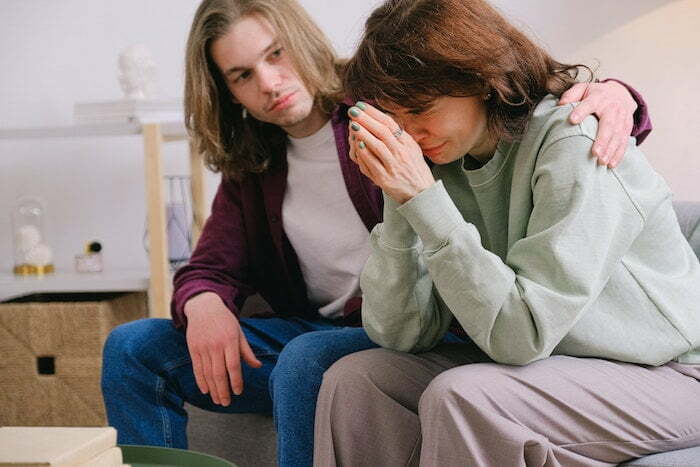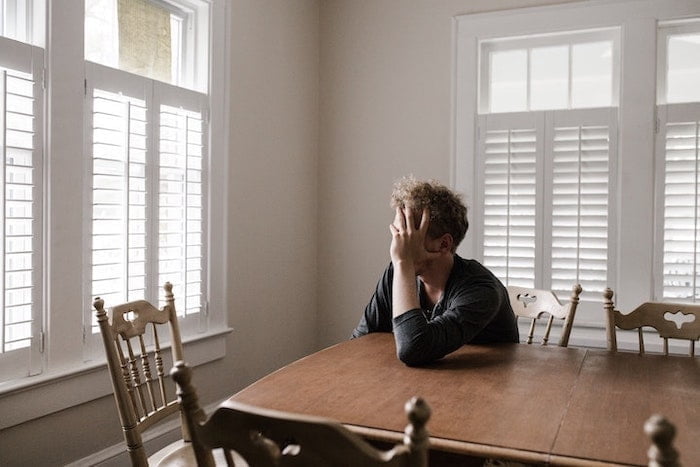Quick links for alcohol and suicide
- Mental health, suicidal thoughts and alcoholism
- What is self-medicating in relation to suicidal thoughts and alcoholism?
- What is alcohol dependency in relation to suicidal thoughts?
- Suicide and alcoholism
- The relationship between alcohol and suicide
- Signs someone you love might be contemplating suicide
- What supports recovery from mental health issue, suicidal ideation and alcohol abuse?
- Treatment for alcohol misuse and suicidal ideation
- Peer group support for alcohol and suicide recovery
- Final thoughts on alcohol addiction and suicide
Alcohol abuse and suicide sadly share a strong correlation.
Of those in treatment for alcohol use, 86% have a mental health problem. [1] In the majority of cases it is impossible to tell which condition came first.
There are various risk factors associated with both mental health and addiction conditions.
People who have both a substance use disorder and a mental health problem, for instance, are at a higher risk of suicidal behaviours. [2]
Alcoholism in particular ha been linked to people being more likely to attempt suicide. [3]
Mental health, suicidal thoughts and alcoholism

Woman being comforted by a friend due to concerns of alcoholism and suicidal thoughts
Life comes with its ups and downs. For those who have mental health problems, these can feel more challenging to cope with.
Mental health issues might stem from traumatic experiences in the past, current lifestyle difficulties and more immutable factors like genetics.
Many people living with poor mental health will excessively drink alcohol.
Bipolar disorder, borderline personality disorder and depression in particular are closely linked to alcohol use and its side effects.
Mental health conditions often present with symptoms that can be very difficult and distressing for the person experiencing them.
When a person feels suffocated by depressive black moods, erratic and uncontrolled thoughts or psychotic symptoms, they might be more likely to turn to drink as a way of coping with this experience.
What is self-medicating in relation to suicidal thoughts and alcoholism?

Person sat behind a sofa thinking about alcoholism and suicide
Self-medicating is when a person uses alcohol or drugs to make difficult thoughts, feelings, symptoms or events feel more manageable.
When a doctor prescribes pain relief for a headache, they medicate the symptoms with a pharmaceutical to clear the headache.
Self-medicating is where a person uses a substance to ease the symptoms of a physical or mental illness.
People with mental health problems are often less likely to seek treatment due to the stigma attached to them, as well as the barriers associated with each individual condition. Anxiety, for instance, might make a person too nervous to leave the house to go to appointments.
When a person goes without treatment for mental health problems, substance misuse is likely to increase.
Why do people drink?

Two people sat at a table discussing alcohol addiction and suicide
People drink alcohol for a huge variety of reasons.
At the beginning of a person’s life with alcohol, it’s usually drunk to increase confidence in social situations. In small doses, alcohol relaxes people and makes them feel more chatty.
For many, however, alcohol turns from social use to problematic use.
This is where people are aware of the desired effects (i.e. feeling relaxed) and want to get them from alcohol to try and ease uncomfortable thoughts or feelings.
People use alcohol to escape and this is where it can become dangerous.
Alcohol is often used to self-medicate around the following areas:
- To cope with life in general
- To try and manage feelings and memories linked to trauma
- To deal with their moods
- To try and manage mental health symptoms
Effects of drinking alcohol on the brain and body

Patient speaking with a therapist about alcohol addiction and suicide
Alcohol is toxic to the human body. It’s therefore understandable that it causes worrying side effects and a lot of damage with prolonged regular use.
The brain and nervous system are slowed down and brain cells are destroyed. Serotonin and dopamine, which are chemicals that regulate mood, are disrupted and this seriously affects how a person feels.
This coupled with how alcohol affects hormonal regulation also deteriorates the body’s ability to regulate mood effectively.
Therefore, although mental health problems might cause a person to drink, alcohol also causes mental health problems.
At its worst, alcohol also results in:
- Deterioration of the vital organs leading to cancer, heart disease and other dangerous conditions
- Wernicke Korsakoff Syndrome and dementia, which seriously deteriorate a person’s memory
- Psychosis
- Death through the damage to other organs
What is alcohol dependency in relation to suicidal thoughts?

Two men sat in a residential rehab centre discussing alcohol addiction and suicide
Alcohol dependency occurs when a person regularly drinks alcohol and the bodily systems come to rely on alcohol in order to function as “normal”.
When alcohol is consumed, the vital organs have to “change jobs”.
The liver, for instance, has to focus on eliminating the alcohol from the body because it is a toxin. It’s unable to process waste as effectively and support the other vital organs at the same time.
With prolonged alcohol use the brain comes to rely on it to regulate mood, its natural system of releasing “happy chemicals” no longer works efficiently.
A dependency is shown when alcohol leaves the body and withdrawal kicks in.
Alcohol withdrawal symptoms include:
Suicide and alcoholism

People holding hands and talking about suicide and alcohol abuse
As already mentioned, 86% who enter treatment for alcohol problems also have mental health problems.
t’s important, also, to acknowledge that there will also be many people not accessing treatment for alcohol who also have mental health problems.
A person doesn’t need to be in treatment for a problem to exist and for the consequential risk of side effects to occur.
When a person has an alcohol use disorder, they’re at an increased risk of suicidal thoughts and behaviours.
There are factors, however, that increase the risk of suicide even for those who don’t drink

Man holding his head and speaking with a medical professional about suicide and alcohol addiction
Factors influencing suicide beyond alcohol abuse
The government has recorded that in 2018 there were 6,507 deaths by suicide in UK. [4]
The vast majority of these (75%) were male.
Circumstances and events that might influence a person into taking their own life are as follows:
- Mental health problems
- A history of being abused
- Bereavement of a loved one
- Financial problems and related consequences (i.e. threat of losing a house)
- Chronic pain and illnesses
- Relationship break-ups
Suicide is also higher amongst those who are marginalised.
This could be linked to these people being bullied and discriminated against
It’s fair to point out that people with addictions are marginalised in society and many also suffer from mental health problems.
An effective professional support team will understand this and it will influence their input to be compassionate, empathic and open-minded.
The relationship between alcohol and suicide

Two people talking about suicide and alcohol abuse
Although drinking might make people feel as though life or a problem is a bit easier to face in the initial moment, prolonged drinking over time increases the risk of people taking their own lives.
Research shows that alcohol abuse might cause suicide through: [5]
- Disinhibition (acting in reckless ways)
- Impulsiveness
- Impaired judgment
The same study stated that “psychosis, mood disorders and anxiety disorders, as well as susceptibility to stress” can make a person more likely to take their own lives.
These mental health factors are likely intensified by alcohol use.
Both being under the influence of alcohol and alcohol withdrawal can make people more likely to take their own lives
Signs someone you love might be contemplating suicide

Man holding his head suffering from signs of suicidal ideation and alcohol abuse
There are signs you can look out for [6] if you’re worried that someone you love might be considering suicide, such as:
- The person saying so, or that they “wish they weren’t here”
- The desire to escape (often why people abuse alcohol too)
- Mood swings
- Lack of motivation/interest in things
- Feeling like everything is hopeless and helpless
- Isolating behaviours
- Drinking more
- Involved in more risky behaviours
It’s important to remember that some people who experience suicidal ideation will present as content or happy. Not all those living with these feelings will “look depressed”.

Person speaking to a medical professional about alcohol addiction and suicidal thoughts
What to do if you or a loved one is having suicidal thoughts
There are people you can speak to if you’re having suicidal thoughts.
In the UK, you can call the Samaritans on 116 123.
Alternatively, you can speak with your local GP.
If you have a loved one who feels this way and they open up to you, give them space to say what they need to.
Do not interrupt. Don’t tell them what they should or shouldn’t do.
Above all you should strive to stay calm, as difficult as this can be.
Simply listen, tell them you care or love them, and then help them to access support.
For those who have both mental health problems and a drinking problem, quitting alcohol greatly reduces the risk of suicide.
The OK Rehab team is also trained to speak and work with people about mental health and addiction problems. A call to us can help you to find practical recovery support in your area.
What supports recovery from mental health issue, suicidal ideation and alcohol abuse?

Group therapy session for alcohol addiction and suicide
It is possible to recover from alcohol addiction and mental health problems.
As with any type of illness, treatments are required.
In terms of these illnesses, it’s been shown time and time again that recovery is made possible through human connection.
- Reaching out to others reduces isolation.
- Social connection strengthens the desire to recover.
- Talking and sharing addiction experiences enable people to cope.
Treatment for alcohol misuse and suicidal ideation

Man speaking with a care worker during treatment for alcohol abuse and suicidal ideation
There are many treatment options for alcohol use disorder and alcohol-related problems in the UK.
The most effective treatment includes participation in a rehabilitation programme.
For those with severe addictions, rehab programmes are most effective when started as a residential stay at a dedicated drug and alcohol clinic.
This provides a complete and thorough approach to treatment and ensures the individual undergoes a safe, supervised medical detox.
Where physical dependencies exist, it’s important for patients to be under a doctor’s supervision. With sufficient clinical support, a detox is made comfortable and withdrawal symptoms are reduced.
Psychological therapies provide strategies for people to manage their thoughts and feelings around alcohol and drinking habits.
When a person can observe, understand and take better control of their thoughts, they’re able to do the same with their behaviours.
This is also where people come to understand the causes of their alcohol use and how to build a future without it.
Peer group support for alcohol and suicide recovery

Peer support group meeting to discuss alcoholism and suicide
Where addiction exists, peer support groups provide an incredibly important social network of people to support healing.
12-step groups are especially helpful for those with alcohol and mental health issues.
The 12-step framework provides a structure for people to base their recovery on.
This is also an environment where people get a sponsor to guide them, which is especially helpful when cravings occur.
Peer groups provide consistency through regular meetings, connection to others who totally understand your situation, and examples of how a life of healing can be built.
Final thoughts on alcohol addiction and suicide

Young woman speaking with a therapist about suicide and alcohol addiction
Drinking and mental health problems often coexist.
People choose to self-medicate with alcohol to ease mental health symptoms and alcohol use creates mental health issues.
Prolonged alcohol use increases the risk of both physical and psychological illnesses.
There is a strong link between alcohol misuse and suicidal thoughts and behaviours.
People can heal. Building a life of recovery is possible within a rehabilitation programme where all areas of a person’s health and life are considered and treated.
Contact OK Rehab to find out more about what your local recovery options are.
References for alcohol and suicide
- https://assets.publishing.service.gov.uk/government/uploads/system/uploads/attachment_data/file/625809/Co-occurring_mental_health_and_alcohol_drug_use_conditions.pdf
- https://www.ncbi.nlm.nih.gov/pmc/articles/PMC7684198/
- https://www.jcpsp.pk/archive/2016/Feb2016/13.pdf
- https://www.ons.gov.uk/peoplepopulationandcommunity/birthsdeathsandmarriages/deaths/bulletins/suicidesintheunitedkingdom/2018registrations
- https://www.ncbi.nlm.nih.gov/pmc/articles/PMC2872355/
- https://www.nimh.nih.gov/health/publications/warning-signs-of-suicide






